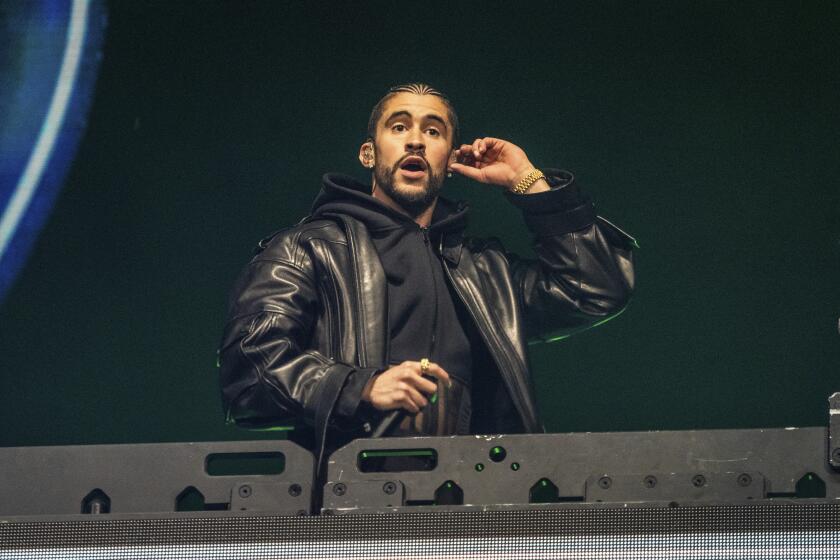Burning Spear Aims to Stay True to Roots Reggae
- Share via
There is no more pure exponent of roots reggae than Burning Spear.
Reggae has gone through a number of permutations in the 15 years since it came out of Jamaica and began making inroads on the international pop scene. But Spear, who appears with his nine-piece Burning Band at the Coach House in San Juan Capistrano tonight, has remained faithful to his equation of hypnotic bass-driven rhythms, flashing horns and studio-enhanced “dub” instrumental sections.
“I am here to do the work, and it is my duty to maintain the way I start,” said Spear, born Winston Rodney, before a performance in Los Angeles last week. “I have to maintain what I believe in and the things I am dealing with.
“The kind of music I’m dealing with is more a long-term music. Sometimes a little discourage runs along on your thought, but I am here to push it back. Discourage is a sign of weakness, and I don’t like to be weak.”
Spear’s voice has long been considered one of the natural marvels of reggae. It’s the vocal equivalent of Guinness Stout--rich and grainy, dark and gritty. When people praise a vocalist by saying he or she could sing the phone book, they usually mean the singer can turn the mundane into something beautiful. But Spear, who has been described as a shaman or a village elder passing on cultural traditions, could turn it into a mystic incantation.
Spear’s themes usually focus on questions of black identity and the African heritage--several of his songs have been written about Marcus Garvey, the black nationalist philosopher who was born and died in Rodney’s home parish of St. Ann’s in Jamaica.
“I feel that no one should be ashamed or have fear or doubt within themselves when they speak about the roots or Africa wherein I and I originate from,” he said. “It’s like an individual who tries to disown himself, and to me, it is a form of defeat by disowning yourself.”
Rodney began developing the idea for Burning Spear during the ‘60s. It was first a group, then a vocal duo featuring Rodney and Rupert Willington. Burning Spear made its first recordings in 1969 for noted Jamaican producer Coxsone Dodd. A few singles were released that did not make much of a mark, but that changed dramatically when Burning Spear, at that point a vocal trio after Delroy Hines joined the others, released “Marcus Garvey” late in 1974.
That single became a sensation in Jamaica, and it established Burning Spear’s position at the forefront of reggae artists. Follow-up singles such as “Slavery Days” cemented the group’s popularity. In the mid-’70s, Burning Spear rivaled Bob Marley & the Wailers in popularity on the island.
Island Records noticed, signing Burning Spear in the first batch of reggae artists to join the label. The “Marcus Garvey” album, released in 1976 on Island’s Mango subsidiary, is now acknowledged as a classic. A “dub” version of the album, called “Garvey’s Ghost” and also released in ‘76, marked the first time pop audiences outside of Jamaica were exposed to the technique, in which songs are remixed and treated using various studio effects to create a mysterious, spooky aura.
Rodney recorded one more album with the trio, then, in 1977, Burning Spear became a solo vehicle for him. He recorded a live album in England before splitting with Island. He then released two albums, recorded with top Jamaican studio musicians. One of them is the excellent “Social Living,” which was never released in America.
Rodney formed the Burning Band in 1981.
“Having a band was part of my heart’s desire, musically,” Rodney said. “Within myself, I was saying that not until you have a band for yourself can you maintain the standard of your songs and the sound become a foundation. You don’t have to feel around for two or three weeks for the sound because the foundation is already built.”
Spear maintained the band through several albums for the independent Heartbeat label. He now records for the Los-Angeles-based Slash, which has released his last three albums, including the current “Live in Paris” double LP. The Slash connection coincided, to the surprise of many long-standing fans, with the addition of brighter, more intricate melodies and even a few straightforward love songs to the Spear repertoire.
“I feel I have the ability musically to present the music on different levels and still maintain the original of me,” Rodney said. “I knew that people would surprise because usually I never get so deeply in singing about love. People didn’t think that I could present the music on such levels.”
But Spear left no doubt that his allegiance to the power and meaningful message of reggae music remains. “Music is supposed to create an associate level, wherein I and you and you and I can associate without any misunderstanding,” he said. “The people who present the music without any concept or proper understanding--music like that is not going anywhere regardless of how much the person might be achieving.
“Music is supposed to be intelligent. Music is supposed to pass along from your children to my children to my children’s children’s children. That means people always coming through wanting to listen to this kind of music, for the music is clean; the music is pure. It’s natural, and it speaks the truth.”
Burning Spear and the Bonedaddys play tonight at 8 and 10:30 at the Coach House, 33157 Camino Capistrano, San Juan Capistrano. Tickets: $16.50. Information: (714) 496-8930.
More to Read
The biggest entertainment stories
Get our big stories about Hollywood, film, television, music, arts, culture and more right in your inbox as soon as they publish.
You may occasionally receive promotional content from the Los Angeles Times.










